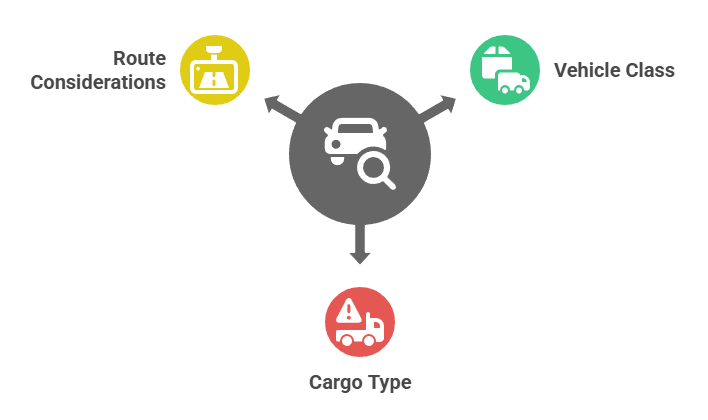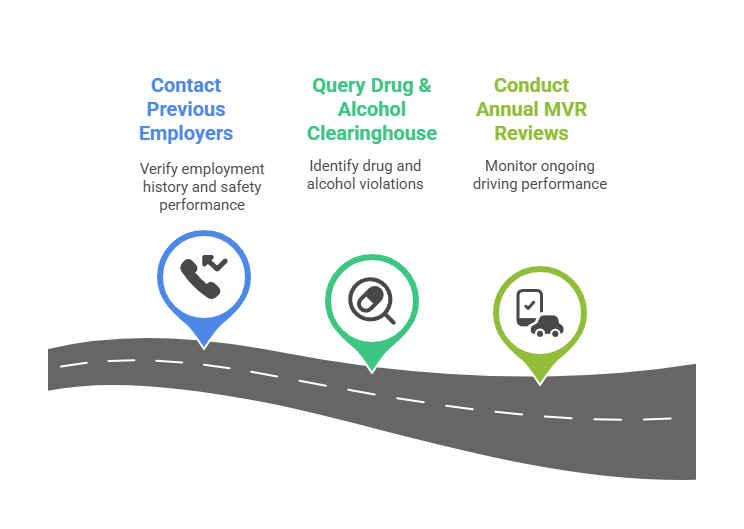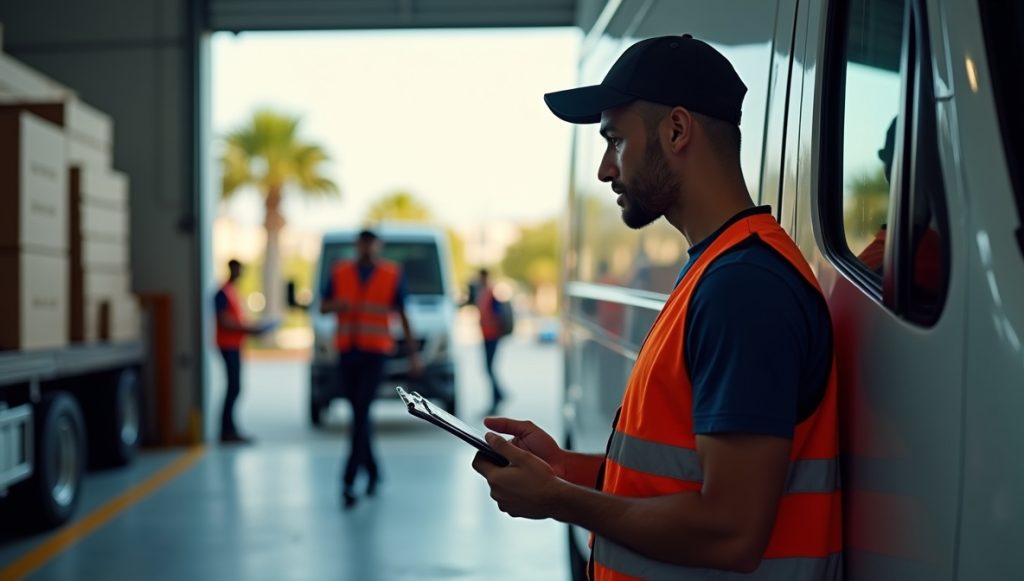California MVR checks require strict adherence to both CCPA privacy regulations and FCRA guidelines, creating unique compliance obligations that differentiate the state from other jurisdictions. Employers conducting California driver history reports must navigate the state's distinctive NOTS (Negligent Operator Treatment System) point system while implementing privacy-first screening protocols for transportation, logistics, and delivery positions where driving records carry heightened legal exposure.
Key Takeaways
- California MVR checks require explicit written consent under both FCRA and CCPA. Employers face penalties up to $7,500 per intentional CCPA violation. Additional FCRA liability includes statutory damages up to $1,000 per violation and attorney's fees for willful non-compliance.
- The state's NOTS point system assigns 1-2 points for most violations. The DMV triggers license suspension at 4 points in 12 months, 6 points in 24 months, or 8 points in 36 months. This impacts hiring decisions differently than other states.
- California employers must provide CCPA-compliant privacy notices before conducting driving record background checks. Employment-related exemptions under California Civil Code § 1798.145(h) significantly limit deletion rights when records serve legitimate business purposes.
- The California Fair Chance Act (AB 1008) requires employers with 5 or more employees to conduct individualized assessments. Employers must document legitimate business necessity rather than applying blanket disqualification policies before denying employment based on MVR findings.
- Transportation companies must comply with 49 CFR § 391.23 requirements. This includes obtaining MVRs from all states where commercial drivers held licenses during the past three years. Employers must also verify employment history with previous DOT-regulated employers and conduct FMCSA Drug & Alcohol Clearinghouse queries.
- Federal FCRA doesn't specify mandatory waiting periods. However, California's Investigative Consumer Reporting Agencies Act (California Civil Code § 1786.40) requires at least 5 business days between pre-adverse action notice and final adverse decisions for investigative reports. Best practice recommends 5-7 days for standard MVRs.
- Continuous MVR monitoring programs for existing employees require annual re-authorization under California law. This distinguishes ongoing screening from initial pre-employment checks and respects employee consent rights.
- California driving record reports include three-year violation histories, license status verification, and current point totals. Employers should consult qualified legal counsel to ensure compliance with evolving regulations.
Understanding California MVR Checks and Legal Requirements
California's Motor Vehicle Report (MVR) system operates under one of the nation's most stringent regulatory frameworks. Federal FCRA requirements combine with California-specific privacy protections to create layered compliance obligations. Understanding these requirements proves essential to avoiding costly litigation and regulatory penalties for HR professionals and hiring managers.
What Is a California MVR Check?
A California MVR check retrieves driving history information directly from the California Department of Motor Vehicles. Employers receive a comprehensive three-year snapshot of an applicant's or employee's driving record. Unlike criminal background checks, California driver license verification specifically focuses on road safety indicators relevant to positions requiring vehicle operation.
The California DMV maintains detailed driver history databases. These systems track everything from minor traffic infractions to serious moving violations. Employers use this information to assess risk for roles involving company vehicles, client transportation, or delivery services. Any position where driving constitutes an essential job function requires this verification.
Federal and State Legal Framework
California MVR for employment purposes must comply with the Fair Credit Reporting Act (15 U.S.C. § 1681 et seq.). This federal law classifies driving records as consumer reports when used for employment decisions. FCRA mandates specific disclosure and authorization procedures, adverse action notifications, and record retention requirements that apply nationwide.
California's Consumer Privacy Act (California Civil Code § 1798.100 et seq.) imposes additional obligations beyond federal requirements. The California Privacy Rights Act (CPRA), which took effect January 1, 2023, provides significant employment-related exemptions. Under California Civil Code § 1798.145(h), these exemptions limit certain CCPA rights when employers collect and maintain driving records for legitimate business purposes.
CCPA Compliance Requirements for MVR Screening
CCPA compliant driving record checks require employers to provide detailed privacy notices at or before MVR data collection. These notices must explain collection methods, usage purposes, storage practices, and sharing protocols. California Civil Code § 1798.100(b) mandates transparency about how personal information will be used.
California residents maintain rights to access their MVR data held by employers. They can request corrections to inaccurate information under California Civil Code § 1798.105. However, deletion rights face significant limitations from employment exemptions in California Civil Code § 1798.145(h). Driving records maintained for legal compliance—such as FCRA, FMCSA regulations, or insurance requirements—qualify for these exemptions.
Employers cannot retaliate against applicants who exercise their CCPA rights. Legitimate business necessity justifies making employment conditional on satisfactory verification for driving positions. Records maintained for internal uses reasonably aligned with worker expectations or exercise of legal claims also fall under employment exemptions.
California's NOTS Point System and Hiring Impact
California's Negligent Operator Treatment System represents a distinctive approach to tracking driver safety. The NOTS system directly influences employment screening decisions across transportation, logistics, and delivery sectors. Understanding point accumulation helps employers make informed, legally defensible hiring determinations.
How the NOTS Point System Works
The California DMV assigns points to drivers' records based on violation severity. Most common infractions carry one-point assessments. More serious violations receive two-point assignments. The DMV maintains rolling point calculations across three different time periods: 12 months, 24 months, and 36 months.
| Point Threshold | Time Period | DMV Action |
| 4 points | 12 months | Negligent operator designation, suspension proceedings initiated |
| 6 points | 24 months | Negligent operator designation, suspension proceedings initiated |
| 8 points | 36 months | Negligent operator designation, suspension proceedings initiated |
Drivers accumulate points from their violation dates, not conviction dates. This creates potential timing considerations for employers conducting California driver history reports. Commercial drivers face more stringent thresholds. The DMV applies heightened scrutiny to Class A and Class B license holders.
Translating NOTS Points into Hiring Decisions
California's point system differs fundamentally from violation-based approaches used in many other states. HR professionals must interpret numeric scores rather than simply reviewing lists of infractions. Transportation and logistics companies typically implement stricter point limits. Organizations where driving represents an occasional job duty may apply more flexible standards.
The California Fair Chance Act (AB 1008, codified in California Government Code § 12952) requires employers with 5 or more employees to conduct individualized assessments. These assessments must examine the nature of driving violations and time elapsed since infractions occurred. The relationship between the driving record and specific job responsibilities also requires evaluation.
An applicant with a five-year-old DUI applying for a warehouse position presents different risk considerations. Compare this to a recent DUI on the record of a candidate for a full-time delivery driver role. Positions that rarely involve driving require distinct assessment criteria from customer-facing delivery roles.
Industries with Heightened MVR Screening Requirements
California's diverse economy creates industry-specific contexts where California driver license verification carries exceptional importance. Certain sectors face elevated legal exposure and operational risks related to employee driving records. These industries implement more rigorous screening protocols.
Transportation and Logistics Sector
Companies in the transportation sector face vicarious liability for employee accidents occurring within the scope of employment. The legal doctrine of negligent hiring further exposes employers who place drivers with problematic MVR histories in positions where subsequent accidents injure third parties.
Major logistics employers implement tiered screening protocols based on specific factors:

- Vehicle Class: Light-duty delivery drivers operating passenger vehicles under 10,000 pounds face less restrictive MVR standards. Class B drivers operating box trucks require more stringent verification. Class A drivers handling tractor-trailers face the most comprehensive screening.
- Cargo Type: Hazardous materials transportation adds scrutiny beyond standard MVR verification. Employers must verify specialized training certifications and Transportation Security Administration (TSA) background checks.
- Route Considerations: Drivers operating in congested urban corridors or residential neighborhoods face different risk profiles. Highway-only routes influence point threshold determinations differently.
These tiered approaches allow companies to match screening intensity with actual operational risks. Federal and state transportation regulations require this calibrated compliance framework.
Cannabis Industry Delivery Services
California Department of Cannabis Control regulations require background checks for delivery personnel. Many local jurisdictions impose additional MVR screening requirements as licensing conditions. Cannabis delivery drivers face unique screening requirements because they transport Schedule I controlled substances under federal classification.
Cannabis employers typically implement zero-tolerance policies for DUI violations within the past five to seven years. The industry faces heightened regulatory scrutiny and ongoing federal-state legal conflicts. Cannabis businesses adopt conservative screening approaches to protect their operating licenses. Local ordinances vary significantly across California municipalities, requiring jurisdiction-specific compliance research.
How to Conduct a Compliant California MVR Check
Implementing legally compliant California MVR screening requires methodical attention to procedural requirements. Documentation practices and applicant communication protocols must satisfy both FCRA and CCPA standards. Following these steps minimizes legal exposure.
Step-by-Step Compliance Process
Begin by providing job applicants with a clear, standalone disclosure document. This document must explain you will obtain a consumer report (MVR) for employment purposes. Per 15 U.S.C. § 1681b(b)(2)(A)(i), the disclosure must appear on a separate document. Employment application materials cannot include this disclosure.
Next, deliver a CCPA-compliant privacy notice per California Civil Code § 1798.100(b). Detail collection methods, usage purposes, storage practices, sharing protocols, and retention periods. California Civil Code § 1786.22 requires employers to provide applicants with copies of investigative consumer reports at delivery. This applies when screening involves investigation beyond standard MVR pulls.
Obtain written authorization using a clear consent form that specifically covers driving record checks. Keep the authorization separate from the disclosure document. Include plain-language explanations of what MVR information the employer will review.
Working with Background Screening Providers
Most California employers partner with Consumer Reporting Agencies (CRAs) specializing in employment background checks. Professional CRAs maintain FCRA compliance infrastructure and CCPA data privacy protocols. Technical integrations streamline the MVR ordering process while reducing employer liability exposure.
Verify providers understand California-specific requirements when selecting a background screening vendor. This includes CCPA compliance, California Fair Chance Act obligations, and state-mandated adverse action procedures. Top-tier CRAs provide compliance training, regularly updated policy templates, and dedicated support for navigating California's complex employment screening landscape.
Understanding MVR Contents
California MVRs include comprehensive driver information spanning three years of history. Professional background screening providers format this information for efficient HR review and decision-making.
| Report Section | Information Included | Employment Relevance |
| Driver Identification | Name, license number, issuance/expiration dates, license class, status | Verifies identity and license validity |
| Endorsements & Restrictions | Hazardous materials, passenger transport, tank vehicles, corrective lenses | Determines specialized assignment qualifications |
| Violation History | Traffic infractions with dates, offense descriptions, point assignments | Identifies risky driving behavior patterns |
| Accident Records | Dates and basic incident information | Shows collision history over three years |
| NOTS Point Totals | Current point balance across 12, 24, and 36-month periods | Assesses proximity to suspension thresholds |
This comprehensive data set enables informed, risk-based hiring decisions. Employers can identify disqualifying violations while respecting applicant privacy rights throughout the screening process.
Making Hiring Decisions Based on MVR Findings
California Government Code § 12952 imposes specific requirements on how employers with 5 or more employees translate MVR check results into employment decisions. Individualized assessments and documentation of business necessity prove essential for legal compliance.
Individualized Assessment Requirements
Employers with 5 or more employees must conduct individualized assessments per California Government Code § 12952. Blanket disqualification policies violate state law. Assessments must examine the nature of driving violations and time elapsed since infractions occurred. The relationship between the driving record and specific job responsibilities requires evaluation.
Document your individualized assessment process thoroughly. Create written records demonstrating you considered relevant factors. These include violation severity, frequency of infractions, evidence of rehabilitation, and whether less restrictive accommodations could mitigate identified risks. Documentation proves essential if applicants challenge adverse employment decisions. Regulatory agencies may investigate screening practices.
Adverse Action Procedures
California driving record background checks that reveal disqualifying information trigger specific FCRA adverse action procedures per 15 U.S.C. § 1681b(b)(3). Begin with a pre-adverse action notice. Include a copy of the MVR, "A Summary of Your Rights Under the Fair Credit Reporting Act," and Consumer Reporting Agency contact information.
Federal FCRA doesn't specify a mandatory waiting period between pre-adverse and final adverse action notices. However, California's Investigative Consumer Reporting Agencies Act (California Civil Code § 1786.40) requires at least 5 business days for investigative consumer reports. Best practice recommends providing 5-7 business days for all MVR-based adverse actions. This allows applicants time to review information and dispute inaccuracies.
After the waiting period, send a final adverse action notice per 15 U.S.C. § 1681m(a). Confirm the decision and provide CRA contact information. Explain the applicant's right to dispute the report's accuracy. Note they can request an additional free MVR within 60 days. Include information about CCPA access rights under California Civil Code § 1798.100.
Establishing Defensible MVR Policies
Develop written MVR screening policies defining clear, objective criteria for different position categories. Base standards on genuine business necessity. Policies should establish NOTS point thresholds and lookback periods for serious violations. Typical lookback periods range from 3-7 years depending on severity. Create graduated response frameworks distinguishing minor infractions from major safety concerns.
Policies should explicitly state that all employment decisions involve individualized assessments per California Government Code § 12952. Meeting or exceeding stated MVR thresholds doesn't automatically disqualify candidates. This language protects against claims of rigid, discriminatory screening practices.
Commercial Driver Compliance Requirements
Federal Motor Carrier Safety Administration regulations under 49 CFR § 391.23 impose comprehensive screening requirements for commercial drivers. These extend beyond standard MVR verification. Transportation companies must navigate layered federal and state obligations to maintain DOT compliance.
FMCSA Multi-Jurisdictional Requirements
49 CFR § 391.23(a)(1) requires motor carriers to investigate driving records for the preceding 3 years. This includes obtaining MVRs from every state where commercial drivers held licenses during that period. However, MVR pulls alone don't satisfy FMCSA requirements. Employers must also complete additional verifications:

- Previous Employer Verification: Contact all DOT-regulated employers from the past 3 years per 49 CFR § 391.23(d). Verify employment history, safety performance, and reasons for leaving.
- Drug & Alcohol Clearinghouse Query: Conduct pre-employment queries in the FMCSA Drug & Alcohol Clearinghouse per 49 CFR § 382.701. This identifies violations that may not appear on state MVRs.
- Annual MVR Reviews: Obtain updated MVRs at least annually for all commercial drivers per 49 CFR § 391.25. This monitors ongoing driving performance.
These comprehensive requirements reflect elevated safety standards. The catastrophic damage potential associated with commercial vehicle operations demands thorough screening. California's major ports including Los Angeles, Long Beach, Oakland, and San Diego handle significant commercial traffic.
California-Specific Commercial Standards
California commercial drivers face state-specific regulations beyond federal FMCSA requirements. The California Air Resources Board (CARB) maintains truck registry requirements for vehicles operating in the state. Port drayage operations require specialized screening for drivers handling intermodal containers. Navigating port facilities with heightened security protocols demands additional verification.
Ongoing MVR Monitoring Programs
Initial pre-employment California MVR checks provide only a snapshot of driving history at a single point in time. Employees may develop problematic records after hire dates. Both continuous monitoring and annual reverification protocols address gaps in employer awareness.
Continuous Monitoring with Annual Re-Authorization
Automatic alerts notify employers when employees incur new violations through continuous MVR monitoring programs. License suspensions or other driving record changes trigger immediate notifications. These programs prove particularly valuable for transportation, delivery, and logistics companies. Staff in these sectors regularly operate vehicles.
California law requires fresh authorization before implementing continuous monitoring for existing employees. Initial pre-employment authorization doesn't automatically extend to ongoing post-hire screening. Consent forms must specifically include clear language about continuous monitoring. HR departments should obtain annual re-authorization from employees subject to continuous MVR screening. Document that monitoring continues throughout employment. Confirm employees maintain rights to revoke consent.
Annual Reverification Protocols
Organizations not implementing continuous monitoring should establish annual MVR reverification for positions involving regular driving duties. Annual checks balance employer needs for current driving record information against administrative burden. This cadence typically satisfies insurance carrier requirements. It provides reasonable protection against negligent retention claims.
Schedule reverifications based on hire date anniversaries or establish company-wide screening cycles. Provide employees with fresh FCRA disclosures and CCPA privacy notices before each reverification. Document reverification schedules in writing. Apply them consistently across all employees in driving positions to avoid discriminatory screening practices.
California-Specific Compliance Challenges

California's regulatory complexity creates particular challenges for HR professionals implementing MVR screening programs. Multi-state driver histories require comprehensive searches. Privacy rights must balance with safety needs. DMV processing delays demand strategic planning.
Managing Multi-State Driver Histories
Many California employees hold or previously held driver's licenses in other states. FCRA requires employers to search "reasonably available" jurisdictions per 15 U.S.C. § 1681c. This generally includes states where applicants previously resided. For commercial drivers, 49 CFR § 391.23 mandates obtaining driving records from all states where drivers held licenses during the past three years.
Comprehensive background screening providers offer multi-state MVR packages. These automatically search multiple jurisdictions based on address history. Such searches ensure California employers capture driving violations that occurred before individuals moved to California.
Balancing Privacy Rights and Safety Needs
California's privacy protections under California Civil Code § 1798.100 et seq. sometimes create tension with employers' legitimate needs to verify driver safety records. However, employment-related exemptions under California Civil Code § 1798.145(h) recognize that driving record verification serves genuine business purposes. This includes compliance with legal obligations, insurance requirements, regulatory mandates, and customer contractual obligations.
Maintain transparent communication with applicants about why driving record verification proves essential. Link requirements to specific job functions. Implement data minimization practices collecting only necessary information. Apply retention schedules deleting MVR data once employment relationships end and legal retention periods expire.
Addressing DMV Processing Delays
California's DMV has experienced processing delays in recent years. Some MVRs take longer to generate than the typical 2-3 business day turnaround. These delays can complicate hiring timelines for time-sensitive positions. However, employers cannot bypass required MVR screening due to processing delays. This creates negligent hiring exposure and potential FCRA violations if employees begin work before background checks complete.
Build reasonable processing time into hiring timelines. Allow 5-7 business days for California MVR results rather than assuming 1-2 day turnarounds. Communicate expected timelines clearly to candidates during the offer stage. Explain that employment start dates remain contingent on satisfactory background check completion. Consider offering conditional employment arrangements where candidates can complete onboarding activities while awaiting MVR results. Ensure they don't perform actual job duties—particularly driving—until California driver license verification completes successfully.
Conclusion
California MVR checks require employers to navigate complex regulatory frameworks. FCRA federal requirements combine with California-specific privacy protections under the CCPA and its employment exemptions. The state's distinctive NOTS point system and stringent commercial driver standards create unique compliance challenges. The California Fair Chance Act requires employers with 5 or more employees to conduct individualized assessments rather than applying blanket disqualification policies. Thorough pre-employment screening protocols must comply with 15 U.S.C. § 1681b(b) and California Civil Code provisions. Continuous monitoring requires proper annual re-authorization. Document individualized assessments per California Government Code § 12952 to make informed, legally defensible hiring decisions. Given the complexity of employment screening laws and evolving regulations, employers should consult qualified legal counsel to ensure compliance with federal and state requirements applicable to their specific circumstances.
Frequently Asked Questions
How much does a California MVR check cost?
California MVR checks typically cost between $10-$25 per report when ordered through background screening companies. Volume discounts are available for frequent screenings. Employers ordering directly from the California DMV pay $5 per record for certified copies. Most organizations prefer working with Consumer Reporting Agencies that provide FCRA-compliant reporting formats and integrated compliance tools.
How long does a California MVR check take?
Most California driver history reports return within 2-5 business days when ordered through professional background screening providers. DMV processing delays occasionally extend turnaround times to 7-10 business days during peak periods. Employers should build reasonable processing windows into hiring timelines rather than assuming instant results.
Can applicants refuse California MVR checks?
Applicants maintain the right to refuse MVR authorization under both FCRA (15 U.S.C. § 1681b) and CCPA. However, employers can withdraw job offers or decline candidates who refuse consent for positions where driving represents an essential job function. Legitimate business necessity justifies making employment conditional on satisfactory driving record verification.
What violations appear on California MVRs?
California MVRs display three years of traffic violations. These include speeding tickets, cell phone use while driving, improper lane changes, and following too closely. Stop sign violations, DUI convictions, reckless driving, and hit-and-run incidents also appear. Reports show accident history, current NOTS point totals, license status and class, endorsements, restrictions, and medical certification information for commercial drivers.
Do California MVR checks show accidents?
Yes, California driving record reports include accident history for the past three years. Reports show accident dates and basic incident information. However, MVRs typically don't indicate fault determinations. Employers needing detailed accident information including fault findings should review police reports or other investigative documents beyond standard MVRs.
How far back do California MVR checks go?
California MVRs display three years of driving history. This includes violations, accidents, and license actions. The timeframe aligns with NOTS point system calculation periods tracking 12-month, 24-month, and 36-month rolling windows. Certain serious violations like DUI convictions may remain visible on driving records for ten years or longer.
Are California MVR checks required by law for all employers?
California law doesn't mandate MVR checks for all employers. However, specific industries face regulatory requirements. Transportation network companies must comply with California Public Utilities Commission regulations. Commercial motor carriers must follow 49 CFR § 391.23. Cannabis delivery services face Department of Cannabis Control requirements plus local ordinances. Even without explicit legal mandates, employers whose staff regularly operate vehicles should conduct MVR screening to mitigate negligent hiring liability.
What's the difference between FCRA and CCPA compliance for MVR checks?
FCRA (15 U.S.C. § 1681 et seq.) is federal law requiring specific disclosure, authorization, and adverse action procedures. This applies to employment-related background checks including MVRs. CCPA (California Civil Code § 1798.100 et seq.) is California state law providing privacy rights. However, California Civil Code § 1798.145(h) provides significant employment exemptions. These limit deletion rights when records serve legitimate business purposes. California employers must comply with both frameworks simultaneously.
Additional Resources
- California DMV Employer Pull Notice Program
https://www.dmv.ca.gov/portal/driver-education-and-safety/educational-materials/fast-facts/employer-pull-notice-program-ffdl-28/ - Federal Trade Commission FCRA Guidance for Employers
https://www.ftc.gov/business-guidance/resources/using-consumer-reports-what-employers-need-know - California Privacy Protection Agency CCPA Compliance Resources
https://cppa.ca.gov/regulations/ - FMCSA Commercial Driver Background Check Requirements
https://www.fmcsa.dot.gov/regulations/title49/section/391.23 - California Department of Fair Employment and Housing Fair Chance Act Guidance
https://calcivilrights.ca.gov/fair-chance-act/
Still have questions?
Get in touch with our team today for a personalized demo and discover how our tailored volume pricing and packages can drive results for your business!
How useful was this page?*
Note: your comments are anonymous. We use them to improve the website. Do not include any personal details.
Visit our FCRA Compliance Tool or leave a message here if you need a response.
From the blog Explore the GCheck Content Hub

What Shows Up on a Home Health Aide Background Check: A Complete Compliance Guide for Employers and Job Seekers
4 Dec, 2025 • 18 min read
Hospital Volunteer Background Check: Complete Compliance Guide for Healthcare Facilities
4 Dec, 2025 • 20 min read
Florida MVR Check: Complete Guide to Driving Record Screening for Employers
4 Dec, 2025 • 16 min readThe information provided in this article is for general informational and educational purposes only and should not be construed as legal advice or a substitute for consultation with qualified legal counsel. While we strive to ensure accuracy, employment screening laws and regulations—including but not limited to the Fair Credit Reporting Act (FCRA), Equal Employment Opportunity Commission (EEOC) guidelines, state and local ban-the-box laws, industry-specific requirements, and other applicable federal, state, and local statutes—are subject to frequent changes, varying interpretations, and jurisdiction-specific applications that may affect their implementation in your organization. Employers and screening decision-makers are solely responsible for ensuring their background check policies, procedures, and practices comply with all applicable laws and regulations relevant to their specific industry, location, and circumstances. We strongly recommend consulting with qualified employment law attorneys and compliance professionals before making hiring, tenant screening, or other decisions based on background check information.

